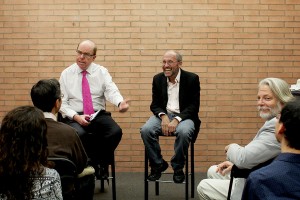Conversation examines midterm elections
New York Times journalist Adam Nagourney sat down with Professor Bob Shrum Thursday afternoon in the Von KleinSmid Center as part of the latest “Political Conversations” series, presented by the Department of Political Science in partnership with the Political Student Assembly.

Red state, blue state · Professor Bob Shrum (left) and The New York Time’s Adam Nagourney (right) speak about the election on campus. – Christine Yoo | Daily Trojan
The theme for the discussion was, “What Happened in the Midterms — and What Happens Next?” The midterm elections saw the G.O.P. add to their majority in the House of Representatives and retake the majority in the Senate, which the Democratic Party had held for the past eight years. Shrum began by noting the failure of the Democrats to turn out voters in the midterm election.
“There was this vaunted turnout operation, supposedly modeled on what Obama did, and it didn’t seem to matter at all,” he said.
Nagourney, who is the Los Angeles bureau chief for The New York Times agreed, but noted that the reasons for the low turnout were unclear.
“I’m not sure what went on,” he said. “The Democrats put a ton of money into voter identification and voter turnout, and you don’t see any evidence that it made much of a difference.”
A central theme of the discussion was the tendency of Democratic candidates across the nation to distance themselves from Obama and his policies, rather than embrace them. According to Nagourney, the Democrats should have made the opposite decision — recognizing that Republican voters were going to vote for Republican candidates no matter how visible Obama was.
“I think they made some tactical mistakes in how they used or did not use the President,” he said. “I think it would have made more sense to have the President out there more.”
Shrum said the same mistake was true of immigration reform, which the Democrats avoided promoting over the summer on the grounds that it would cost them moderate Senate seats in the election.
“I wonder if President Obama would have been better off if he had done the immigration thing,” he said.
With regard to the Senate election in Colorado, Shrum partially blamed the lack of Latino turn out for the Democrat’s loss, something that might have been helped if immigration reform had been passed.
“Latino turnout in Colorado was pathetic,” Shrum said. “People were angry because [Democrats] hadn’t kept their word.”
Nagourney also attributed the Democrats’ poor midterm performance to the rise of ISIS and Ebola, and the perception that Obama was not in complete control of either of those issues.
“People were feeling threatened and that things were out of control, in the sense that Obama was not showing leadership,” he said. “He came across as someone who was overwhelmed and didn’t know what to do, even if that wasn’t the case.”
Nagourney said that Obama can be a strong communicator about big issues like ISIS and Ebola when he wants to be, but despite that, was pessimistic about the chance for cooperation with Republicans in the next two years.
“Obama is very capable when making a case,” Nagourney said. “But there is no prospect they are going to work together.”
Nagourney cited the presence of Tea Party Republicans who prevented immigration reform and forced the shutdown of the government as proof that the trend will continue.
Both Shrum and Nagourney developed core tenets for the Democrats in midterm elections going forward: the need to involve the President more, communicate the effectiveness of their policies and select better candidates.
Nick Spear, a sophomore majoring in political science, said the event was important because it highlighted campaign strategy.
“There is a lot more that goes into the elections than just the campaign ads you see on TVs,” he said. “There is a lot of strategy that goes into it, and it’s interesting to see how it’s enacted over the whole nation.”
Mathew Goldstein, a senior majoring in political science, said the discussion was vital to maintain the engagement of younger voters at USC.
“It covered a lot of stuff from a reliable source,” he said. “There are a lot of people here, and it’s always good to see young people engaged and asking questions. A lot of stuff was brought up about the future, which is good because that’s what’s going to impact people.”

